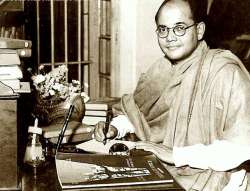Subhas Chandra Bose didn’t die in air crash, was alive in 1947: French report
According to More, the gist of the matter for the French secret service is that Bose did not die in the air crash on August 18, 1945, as commonly held.

While Netaji Subhas Chandra Bose’s death continues to remain a mystery, scholars from across the world continue to dwell deep to find the truth. Paris-based historian J B P More has now come up with a finding that Bose didn’t die in an air crash and was still alive in 1947, says a Times of India report.
“It is not stated in the document that Subhas Chandra Bose died in the air crash in Taiwan. Instead, it is reported that Bose's present whereabouts were unknown as late as December 1947, which again implies that the French did not buy the theory that Bose died in the air-crash on August 18, 1945,” More, who recently stumbled upon a brief French secret service report dated December 11, 1947 at the National Archives of France, was quoted by Times of India as saying.
According to More, the gist of the matter for the French secret service is that Bose did not die in the air crash on August 18, 1945, as commonly held.
“But he escaped from Indochina alive and his whereabouts were unknown as late as December 11, 1947, as reported in the secret document. This implies that he was alive somewhere but not dead in 1947,” said More, quoting the report written for the “Haut Commisariat de France for Indochina "SDECE Indochinese Base BCRI No. 41283 csah Ex No. 616, under the title: "Archival Information on Subhas Chandra Bose.”
While the British and Japanese declared that Bose died in an air crash after he too off from Saion on his way to Tokyo, the French government has always been silent on the issue though Vietnam/Indochina was a French colony during the 1940s. So the findings of More attain significance.
To find out the answer, the Indian government had appointed three commissions. The Shah Nawaz Committee (1956) and Khosla Commission (1970) said that Bose died in an air crash on August 18, 1945 at Taihoku airport in Japanese-occupied Taipei, while the Mukherjee Commission (1999) concluded that he did not die in an air-crash. The government, however, rejected the findings of the Mukherjee Commission.